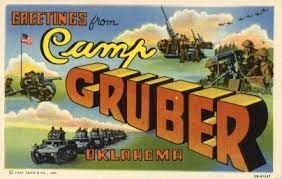Been There Done That Part 11
War was declared in 1941 and the country began drafting men to serve in the Armed Forces. Every man had to register with Selective Service, known as the “draft board,” and there was a national “raffle” drawing to begin the process. The numbers were published and the names were drawn in the order of the raffle. Winning or losing in this raffle determined how long it would be until you were called up. I had a high number and I began to feel a little embarrassed as my friends were drafted and, slowly, there were fewer young men around. Age and marital status were the criteria as well for the order of selection. Young unmarried went before the married and those with children had a further delay.
The war was going on in Europe against the Germans and in the Pacific against the Japanese. News about the fighting in both theatres was printed daily and the obituary columns were filled with names I knew.
When I was drafted and entered service on August 20, 1943, I had been married to Grace [Maisel] for three months and living on East 23 Street. Our wedding ceremony was simple. We went to Cantor Martin Adolph’s house with our parents and close relatives and he performed the ritual. Then we all went downtown to the Colonial Inn Restaurant for a celebratory luncheon.
Orders came through for me to report for Army duty and on August 20 I went downtown to City Hall Annex on Ellison Street where several busses were waiting to take the draftees to Fort Dix. I had said goodbye to my bride at home because her father suggested that it might be too tearful to part in public. My feelings were confused, not knowing what the future held for me. As a recent bridegroom, I wondered when or even if I would see my love again. I boarded the bus and we arrived at Fort Dix a couple of hours later to begin the transformation from civilian life to army service. The straggly group of civilians lined up in front of a regular army sergeant who reminded us, as if that was needed, that we were in the army now.
I recall staying in Fort Dix for a few weeks. They posted the assignments each day on the barracks bulletin board, and one day my name appeared on shipping orders to Camp Gruber, Oklahoma, to join the 42nd Infantry Division. I had been calling Grace almost every day from Dix. This day, aware of the security imposed on me, I used a private code to tell her where I was going. I said, “Hi, honey, remember the show we saw a couple of months ago, well I may be seeing it again,” so she knew it was Oklahoma.
The 42nd Division was known as the Rainbow Division* and was famous for its action in World War I. It was conceived to be representative of the ethnic and geographic diversity of the nation by having troops from every state and ethnic origin*. We had little entertainments from time to time in the day room and I found myself writing skits which I put on, usually for birthdays or other events.
While stationed at Camp Gruber, I was sent to take courses for specialized training. One was “Soldier Show School,” where we were given scripts used on radio for Jack Benny, Fred Allen, Lum and Abner, and others. Attendance in this course was entered on your personal record which went everywhere with you and must have helped me to get a great job in Japan after the war when I was part of the occupation force there.
I do not remember how Allen Funt got me to help him put on a radio show over station KVOO, Tulsa. Our show was called “Behind the Dog-Tag,” an audience participation show where GIs were called upon to engage in some type of gag and were rewarded in various ways. My part, as producer, was to arrange the rewards, like arranging for a mother’s surprise visit to her son or a weekend on a Texas ranch. I also was responsible for executing Allen’s practical jokes. I got every Thursday off from training, so I got a chance to be with Grace who had moved to Oklahoma to join me. Grace didn’t care much for Allen Funt because he took up too much of my time. I have no doubt that Allen Funt created “Candid Microphone” and then, as the technology changed, Candid Camera,” from “Behind the Dog-Tag.”
I was sent to Demolition School where the students were trained to handle all kinds of explosive material that the army used. It was basically a course in mines and booby traps, although I learned to use TNT, dynamite, Compound C, and Bangalore torpedoes. I developed some expertise in this which served me well in combat in the Philippines when I placed mines and booby traps around the perimeter each night and defused them each morning. It was tricky business and many men blew themselves up for lack of experience.
In the meantime, I had applied for Officers Candidate School. My first choice was the Air Corps. I thought I could be a pilot, but I flunked the color test because I was color-blind. Encouraged by the officers, I was accepted for training for Infantry School at Fort Benning, Georgia. Orders finally came through to report to Fort Benning to start seventeen weeks of training to turn me into an officer and
a gentleman. Thus began another phase of the army adventure. It was both physical and technical, getting leadership training and experience on every weapon used by ground troops, from the .45 caliber automatic pistol to the 105mm Howitzer.
I successfully completed the training and I got my gold bars around September of 1944, with orders to report to Fort Ord, California. My young wife accompanied me in an upper berth [on the train] across the country. I actually reported 12 hours late because of some train delays which were no excuse to the Army. I had been officially AWOL for the 12 hours and was fined $25 but did not face a court martial. This delay was fortuitous because if I had arrived earlier, I would have shipped right out on the list that was already made up. The next list took about 6 weeks, so Grace and I had a holiday. We rented a room in a house in Pacific Grove and we saw a great deal of this beautiful area of California. In December 1944, I was sent to San Francisco to board a troop ship for somewhere in the Pacific. Grace went home alone and that belongs to her story.
Joseph Zimel



